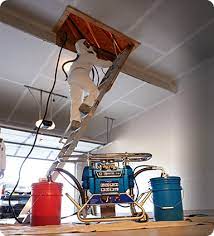Home » Construction News (Page 2)
Category Archives: Construction News
Transforming Multi-Family Living: The Role of Renovation Contractors
Multi-family properties have always been a crucial part of the real estate landscape, offering diverse housing options to individuals and families. However, as these properties age, they often require renovations to maintain their appeal and functionality. This is where multi-family renovation contractors play a pivotal role. In this comprehensive guide, we will delve into the world of multi-family renovation contractors, exploring their significance, the renovation process, key considerations, and the benefits of investing in such projects.
The Significance of Multi-Family Renovation Contractors
Multi-family renovation contractors are professionals with a unique set of skills and expertise tailored to the specific needs of multi-unit properties. Here are some reasons why their role is significant:
Expertise in Multi-Unit Projects: Multi-family contractors specialize in working on properties with multiple units, which can be a complex undertaking. Their experience and knowledge in handling these projects are invaluable.
Cost-Effective Solutions: Renovating multiple units at once can be more cost-effective than tackling them individually. Multi-family renovation contractors can leverage economies of scale and help property owners save on costs.
Streamlined Project Management: These contractors are equipped to handle the intricacies of coordinating and managing multiple units concurrently, ensuring that the project progresses smoothly and efficiently.
Compliance with Regulations: Multi-family properties often have specific regulations and codes to adhere to. Renovation contractors are well-versed in these rules and can help property owners navigate them successfully.
The Multi-Family Renovation Process
Understanding the renovation process is essential for property owners and investors looking to improve the value and functionality of multi-family properties. Here’s an overview of the typical steps involved:
- Assessment and Planning:
- Initial property assessment to identify renovation needs.
- Collaboration with property owners to set goals and budget.
- Design and planning phase to create a renovation roadmap.
- Preparing the Property:
- Obtaining necessary permits and approvals.
- Securing the property for safety during the renovation.
- Temporary relocation of tenants, if needed.
- Renovation and Construction:
- Demolition of existing structures.
- Implementing the planned renovations, including structural changes, electrical and plumbing updates, and aesthetic improvements.
- Quality Control and Inspections:
- Regular inspections to ensure the work meets industry standards.
- Addressing any issues or defects promptly.
- Tenant Communication:
- Keeping tenants informed throughout the renovation process.
- Minimizing disruptions and ensuring their comfort.
- Completion and Handover:
- Final inspections and approval from local authorities.
- Handing over the renovated units to property owners or management.
Key Considerations for Multi-Family Renovations
Successful multi-family renovations require careful planning and execution. Here are some key considerations to keep in mind:
- Budgeting:
- Establish a realistic budget that includes construction costs, permits, and contingency funds.
- Plan for unexpected expenses that may arise during the renovation process.
- Tenant Relations:
- Maintain open communication with tenants to minimize disruptions.
- Provide adequate notice before entering their units for renovations.
- Regulatory Compliance:
- Ensure that all renovations adhere to local building codes and zoning regulations.
- Obtain the necessary permits and approvals before commencing work.
- Sustainability:
- Consider eco-friendly renovation options to reduce environmental impact and appeal to environmentally conscious tenants.
- Long-Term Value:
- Invest in renovations that enhance the property’s long-term value, such as energy-efficient upgrades and quality materials.
Benefits of Investing in Multi-Family Renovations
Investing in multi-family renovations offers a range of benefits for property owners, investors, and tenants alike:
- Increased Property Value:
- Well-executed renovations can significantly increase the property’s market value, attracting higher rents and potential buyers.
- Enhanced Tenant Satisfaction:
- Upgraded units with modern amenities and improved functionality lead to happier tenants, reducing tenant turnover.
- Competitive Edge:
- Renovated properties can stand out in a crowded rental market, attracting a larger pool of potential tenants.
- Lower Maintenance Costs:
- Renovating with quality materials and modern systems can lead to reduced maintenance costs over time.
- Regulatory Compliance:
- Staying up-to-date with building codes and regulations can prevent legal issues and fines.
Conclusion
Multi family renovation contractors play a pivotal role in transforming aging multi-unit properties into modern, efficient, and profitable assets. Their expertise, project management skills, and knowledge of regulatory compliance make them essential partners in the renovation process.
By understanding the significance of multi-family renovation contractors, the renovation process, key considerations, and the benefits of investing in such projects, property owners and investors can make informed decisions that contribute to the long-term success of their multi-family properties. Whether you’re aiming to increase property value, enhance tenant satisfaction, or stay in compliance with regulations, these professionals are key to achieving your renovation goals.
How to Choose the Perfect Ready Mix Concrete Company: A Comprehensive Guide

When it comes to construction projects, whether big or small, the quality of your concrete can make or break the entire endeavor. Ready mix concrete has become the go-to choice for many builders and contractors due to its convenience and consistency. However, choosing the right ready mix concrete company is crucial to ensure your project’s success. With so many options available, it can be overwhelming to make the right choice. In this comprehensive guide, we’ll walk you through the essential factors to consider when selecting a ready mix concrete company, so you can make an informed decision and achieve the best results for your project.
Define Your Project Requirements
Before you even begin searching for a ready mix concrete company, it’s essential to have a clear understanding of your project’s requirements. Ask yourself the following questions:
- What is the size and scope of the project?
- What is the required strength and durability of the concrete?
- Are there any specific additives or admixtures needed?
- What is the project’s budget and timeline?
Having a precise idea of your project’s needs will help you communicate effectively with potential suppliers and ensure that the concrete company you choose can meet your specifications.
Research and Shortlist Potential Companies
Once you have a clear understanding of your project requirements, it’s time to start researching potential ready mix concrete companies. Here’s how to go about it:
Ask for Recommendations: Seek recommendations from colleagues, friends, or other professionals in the construction industry. They may have worked with reliable concrete suppliers before and can provide valuable insights.
Online Research: Use the internet to search for local ready mix concrete companies. Visit their websites to gather information about their services, experience, and customer reviews.
Check Credentials: Verify that the companies are licensed and have the necessary certifications to ensure compliance with industry standards.
Contact References: Request references from the companies and reach out to their past clients. Inquire about their experiences, including the quality of concrete, punctuality, and customer service.
Assess Experience and Reputation
The experience and reputation of a ready mix concrete company are crucial factors to consider. Look for a company with a proven track record of successfully delivering high-quality concrete for various projects. Here’s how to assess their experience and reputation:
Years in Business: A company that has been in business for several years is likely to have accumulated valuable expertise.
Portfolio: Review their portfolio of completed projects to determine if they have experience in projects similar to yours.
Online Reviews: Read online reviews and testimonials from previous clients to gauge customer satisfaction and the company’s reputation.
Awards and Certifications: Check if the company has received any awards or certifications for excellence in the industry.
Quality Control and Testing
Quality control is paramount when it comes to ready mix concrete. Ensure that the company has stringent quality control measures in place. This includes regular testing of raw materials, in-process testing, and final product testing. Ask the following questions:
- Do they have a quality control department?
- What testing procedures do they follow for their concrete?
- Are they willing to provide test reports for the concrete they supply?
Range of Mixes and Admixtures
Different projects may require specific concrete mixes and admixtures to meet the desired strength, durability, and workability. A good ready mix concrete company should offer a variety of mix designs and be willing to customize mixes to your project’s requirements. Inquire about the range of mixes and admixtures they can provide and whether they have experience with specialized concrete types, such as self-compacting concrete or high-strength concrete.
Delivery and Scheduling
Efficient and timely delivery of concrete is critical to keeping your project on track. Consider the following aspects related to delivery and scheduling:
- Do they have a reliable fleet of concrete trucks?
- What is their delivery radius, and can they reach your project site?
- Are they flexible with scheduling to accommodate your project timeline?
- Do they offer options for off-hours or weekend deliveries if necessary?
Environmental Considerations
As sustainability becomes increasingly important, you may want to choose a ready mix concrete company that is environmentally conscious. Inquire about their environmental practices, such as recycling of materials and reducing carbon emissions during production and transportation. Some companies may offer eco-friendly concrete options with lower carbon footprints.
Customer Service and Communication
Effective communication with your concrete supplier is essential for a smooth construction process. Pay attention to their responsiveness and willingness to address your concerns and questions promptly. A company that values good customer service is more likely to prioritize your project’s success.
Cost and Payment Terms
While cost should not be the sole determining factor, it is undoubtedly an important consideration. Request quotes from multiple ready mix concrete companies and compare them. Be cautious of companies that significantly underbid competitors, as this may indicate subpar quality or hidden fees. Additionally, clarify the payment terms and ensure they align with your project’s financial plan.
Insurance and Liability Coverage
Verify that the ready mix concrete company has adequate insurance coverage. This includes liability insurance to protect you in case of accidents or property damage during the concrete delivery and pouring process.
Visit the Plant
If possible, schedule a visit to the company’s concrete batching plant. This allows you to observe their equipment, facilities, and quality control procedures firsthand. It can also provide insights into their commitment to safety and efficiency.
Contract and Terms
Before finalizing your choice, carefully review the contract provided by the ready mix concrete company. Ensure that all project specifications, delivery schedules, pricing, and terms are clearly outlined. If you have any questions or concerns, discuss them with the company before signing the contract.
Conclusion
Choosing the right ready mix concrete company is a crucial decision that can significantly impact the success of your construction project. By following the steps outlined in this comprehensive guide, you can make an informed choice that aligns with your project’s specific requirements, quality standards, and budget. Remember that the selection process should not be rushed; take the time to research, compare, and communicate with potential suppliers. With the right ready mix concrete company by your side, you can build with confidence, knowing that your project is in capable hands.
Unveiling the World of Mechanical Piping Contractors: Masters of Precision and Efficiency
In the intricate world of construction and industrial facilities, there exists a group of professionals who play a pivotal role in ensuring the seamless operation of complex mechanical systems. These unsung heroes are known as mechanical piping contractors. While their work may often go unnoticed, it is fundamental to the functionality of various industries, from heating and cooling systems to power plants and more. In this comprehensive article, we will delve deep into the world of mechanical piping contractors, understanding what they do, why their role is crucial, and how they contribute to the success of projects across the globe.
The Role of Mechanical Piping Contractors
Definition and Scope
Mechanical piping contractors are specialists responsible for the installation, maintenance, and repair of mechanical systems in industrial and commercial settings. These systems include piping, plumbing, heating, cooling, and various fluid-carrying systems. Their role extends beyond the installation, often encompassing design, project management, and regular maintenance.
The Breadth of Their Work Mechanical piping contractors are involved in a wide range of activities, including:
- Installing and connecting pipes and fixtures for water, gas, and other fluids.
- Fabricating and welding piping systems.
- Assembling and installing mechanical equipment like pumps, boilers, and chillers.
- Designing and planning complex piping systems for new construction or renovations.
- Regular inspections, testing, and maintenance of existing systems.
Precision in Piping
Precision in Design
Designing a piping system for an industrial facility or a commercial building is no small feat. Mechanical piping contractors collaborate with engineers and architects to ensure the system meets the specific needs of the project, adheres to all safety codes and regulations, and is efficient in terms of energy consumption.
Material Selection
The choice of materials plays a critical role in the durability and functionality of a piping system. Mechanical piping contractors are well-versed in materials like steel, copper, plastic, and more. They select the right material for the job, taking into account factors such as corrosion resistance, pressure ratings, and cost-effectiveness.
Precision in Installation The installation process involves laying out the piping system according to the design, which requires a high level of precision and accuracy. Mechanical piping contractors must ensure that every joint, valve, and connection is in the right place and properly sealed to prevent leaks.
Safety First
Adherence to Codes and Regulations
One of the most critical aspects of the work of mechanical piping contractors is ensuring that the installed systems comply with safety codes and industry regulations. Compliance is vital to avoid accidents, maintain the integrity of the system, and prevent legal consequences.
Safety Precautions
Working with high-pressure systems and various hazardous materials, safety is paramount. Mechanical piping contractors are trained in safety measures and protocols to prevent accidents and protect both themselves and the environment.
Project Management and Collaboration
Project Coordination
Mechanical piping contractors often serve as project managers, coordinating with various other professionals, including architects, engineers, electricians, and HVAC technicians. Effective project management is crucial to ensure that the mechanical systems are integrated seamlessly into the building or industrial facility.
Collaboration with Other Trades
Collaboration is key to a successful project. Mechanical piping contractors work hand in hand with other tradespeople to ensure that all systems are integrated effectively. This includes coordinating the installation of electrical, HVAC, and plumbing systems, among others.
Industries They Serve
Commercial and Residential
Mechanical piping contractors are involved in projects ranging from the construction of office buildings and apartment complexes to residential homes. They install plumbing systems, heating, and cooling systems to ensure the comfort and functionality of these spaces.
Industrial
In industrial settings, mechanical piping contractors play a vital role in the construction and maintenance of systems used in manufacturing, power generation, and chemical processing facilities. Their work ensures the uninterrupted operation of critical processes.
Energy and Utilities
The energy and utilities sector relies on mechanical piping contractors to build and maintain pipelines, often carrying hazardous materials. Their work ensures the safe and efficient delivery of resources like natural gas and water.
Challenges They Face
Technological Advancements
The field of mechanical piping is not immune to technological advancements. Contractors must continually update their skills and adapt to new tools and techniques to remain competitive and efficient.
Environmental Concerns
As the world grapples with environmental challenges, mechanical piping contractors are increasingly tasked with designing and installing systems that are energy-efficient and environmentally friendly.
Labor Shortages
In recent years, there has been a growing shortage of skilled labor in the construction industry, including mechanical piping contractors. This challenge makes it essential to attract and train new professionals in the field.
Training and Education
Apprenticeship Programs
Many mechanical piping contractors start their careers through apprenticeship programs, where they learn the ropes under the guidance of experienced professionals.
Certification and Licensing
To ensure that contractors have the necessary skills and knowledge, many jurisdictions require them to obtain licenses and certifications. These credentials attest to their competency and understanding of industry standards.
Conclusion
In the grand tapestry of construction and industrial endeavors, mechanical piping contractors are the skilled artisans who weave the intricate threads of piping systems, bringing precision, safety, and functionality to a vast array of projects. From commercial skyscrapers to power plants, their work often goes unnoticed, yet its importance cannot be overstated.
In this comprehensive exploration of their world, we have gained an understanding of the multifaceted role they play in ensuring the smooth operation of complex mechanical systems. Their precision in design and installation, unwavering commitment to safety, project management expertise, and adaptability to evolving technologies all contribute to their status as indispensable professionals.
As our society faces new challenges related to energy efficiency and environmental sustainability, the role of mechanical piping contractors becomes even more critical. These dedicated professionals are at the forefront of creating systems that balance the needs of modern industry with the demands of a changing world.
In conclusion, mechanical piping contractors are the hidden heroes of construction and industry, and their work continues to shape our world, one precise connection at a time.
Who Would Need to Buy Spray Foam Rigs?
Spray foam insulation has become a game-changer in the construction and renovation industry. It offers superior thermal insulation and air sealing properties, making it an invaluable component in energy-efficient buildings. One of the key aspects of working with spray foam insulation is the equipment used, and spray foam rigs are at the heart of this operation. In this article, we will explore the various individuals and businesses that would need to buy spray foam rigs. These versatile machines are vital tools for anyone involved in the insulation and construction business.
Contractors and Insulation Professionals
Spray foam rigs are essential for contractors and insulation professionals who specialize in installing insulation. Whether it’s for residential or commercial projects, these experts rely on spray foam rigs to efficiently and effectively apply insulation material. Spray foam rigs are equipped with the necessary components to ensure a uniform and high-quality insulation application. Contractors often invest in these rigs to meet the demands of their clients while maintaining a competitive edge in the industry.
Home Builders and Developers
Home builders and property developers understand the importance of energy efficiency and green building practices. Spray foam insulation is a preferred choice for these professionals because it not only meets strict energy codes but also enhances the value of the properties they construct. Investing in spray foam rigs allows builders and developers to have control over the insulation process, ensuring the highest quality standards are met in their projects.
Renovation and Remodeling Specialists
Renovation and remodeling specialists often encounter projects where outdated insulation needs replacement or upgrading. Spray foam rigs are a valuable asset for professionals in this sector, as they enable efficient insulation removal and replacement. The precision of spray foam rigs is particularly beneficial in retrofitting older buildings, improving energy efficiency, and reducing utility costs for homeowners.
Energy Auditors and Efficiency Consultants
Energy auditors and efficiency consultants play a crucial role in helping homeowners and businesses identify energy-saving opportunities. Spray foam insulation is often recommended as a solution to improve energy efficiency. These professionals may invest in spray foam rigs to offer comprehensive services that include insulation upgrades, ensuring their clients maximize their energy savings.
Eco-conscious Homeowners
Some homeowners are passionate about reducing their carbon footprint and decreasing their energy bills. They may opt to purchase spray foam rigs for personal use, allowing them to insulate their homes and reduce energy consumption. While this may not be a common scenario, it is a growing trend among environmentally conscious individuals who want to take control of their home’s insulation and reduce their reliance on traditional energy sources.
Agricultural and Industrial Businesses
Agricultural and industrial businesses often require specialized insulation solutions. Spray foam insulation is used in various agricultural applications, such as poultry farms, cold storage facilities, and greenhouses. Industrial businesses also benefit from the high R-value and air sealing properties of spray foam insulation. Purchasing spray foam rigs enables these businesses to insulate their facilities for optimal temperature control and energy efficiency.
Government Agencies and Nonprofits
Government agencies and nonprofit organizations may also invest in spray foam rigs for community projects, particularly those focused on improving energy efficiency and reducing greenhouse gas emissions. These organizations can use spray foam insulation to retrofit public buildings, low-income housing, and community centers, making a significant impact on energy savings and sustainability.
Fire and Disaster Restoration Services
In the aftermath of a fire or natural disaster, rebuilding and restoring structures often involves insulation replacement. Fire and disaster restoration services find spray foam rigs invaluable for efficiently and effectively restoring damaged buildings. The air sealing properties of spray foam can also help prevent further damage caused by moisture infiltration.
Manufacturers of Insulation Materials
Manufacturers of insulation materials are also potential buyers of spray foam rigs. These companies can use the rigs to demonstrate the proper application of their products to potential clients and contractors. Having the ability to showcase their insulation materials’ effectiveness can be a valuable marketing tool in the competitive insulation industry.
DIY Enthusiasts and Hobbyists
Lastly, some DIY enthusiasts and hobbyists with a strong interest in construction and insulation may purchase smaller, more portable spray foam rigs for personal use. While this is not as common as the previous scenarios, it demonstrates the accessibility and versatility of these rigs for a wide range of users.
Conclusion
In conclusion, spray foam rigs are versatile and essential tools for a wide range of individuals and businesses in various industries. From contractors and builders to energy auditors and environmentally conscious homeowners, the demand for these rigs continues to grow as energy efficiency and sustainability become increasingly important.
The ability to efficiently apply high-quality insulation using spray foam rigs not only reduces energy consumption but also contributes to long-term cost savings and improved indoor comfort. Whether it’s for new construction, renovations, or disaster restoration, these rigs play a pivotal role in achieving the desired results.
As the construction industry and society at large continue to prioritize energy efficiency and environmental responsibility, the need for spray foam rigs is likely to expand. With ongoing developments in technology and equipment, these rigs will only become more efficient and accessible, making them an indispensable part of the insulation and construction landscape. So, whether you’re a professional in the industry or a homeowner looking to make your space more energy-efficient, consider the benefits of spray foam rigs in achieving your goals.
Unlocking the Skies: The Art and Science of Construction Scheduling for Skyscrapers

Skyscrapers, the towering symbols of modern cities, are engineering marvels that demand meticulous planning and execution. The construction of skyscrapers isn’t just about stacking concrete and steel; it’s a delicate dance of artistry, technology, and precise scheduling. In this article, we delve into the world of construction scheduling for skyscrapers, exploring how this process ensures the seamless assembly of these mammoth structures that grace our urban skylines.
The Blueprint to the Sky: Pre-construction Phase
Design and Planning
Before a skyscraper can ascend, architects and engineers work tirelessly to design and plan the structure. The design phase involves deciding on the skyscraper’s height, layout, structural components, and aesthetic features. This blueprint serves as the foundation for subsequent scheduling decisions.
Resource Analysis and Procurement
Understanding the resources required, such as materials and labor, is essential for successful scheduling. Procuring these resources in a timely manner and ensuring their availability throughout the project is crucial. This stage often involves negotiating contracts and establishing relationships with suppliers.
Risk Assessment and Management
Identifying potential risks and developing strategies to mitigate them is paramount. Unforeseen events can significantly impact the project timeline, and a robust risk management plan is essential to keep the construction schedule on track.
The Puzzle Pieces: Construction Scheduling Techniques
Critical Path Method (CPM)
CPM is a widely used scheduling technique in skyscraper construction. It identifies the longest path of activities in a project, indicating the minimum time required for an on-time project completion. By pinpointing critical tasks, project managers can allocate resources efficiently to maintain the schedule.
Program Evaluation and Review Technique (PERT)
PERT estimates the duration of each activity by considering optimistic, most likely, and pessimistic scenarios. This probabilistic approach aids in identifying the probability of meeting specific deadlines and assists in resource allocation and risk management.
Gantt Charts
Gantt charts are visual representations of a project schedule, displaying the timeline of activities, their dependencies, and resource allocation. They provide a clear view of the project’s progress and aid in managing resources effectively.
The Dance of Time and Resources: Implementing the Schedule
Activity Sequencing
Once the scheduling techniques are chosen, project managers sequence the activities based on their dependencies and constraints. Understanding which tasks must precede or follow others is crucial for a smooth workflow.
Resource Allocation
Assigning the right resources at the right time ensures that each task is adequately staffed and equipped. Efficient resource allocation maximizes productivity and keeps the project on schedule.
Monitoring and Control
Regular monitoring of the project’s progress against the schedule is essential. This involves tracking completed activities, analyzing delays, and making real-time adjustments to the schedule as needed. A well-monitored schedule allows for timely interventions to mitigate any deviations.
The Skyline Unveiled: Completion and Post-construction Phase
Quality Assurance and Inspections
As the skyscraper nears completion, stringent quality checks are conducted to ensure that the structure meets the required safety and quality standards. Any discrepancies found during inspections are rectified before the building is deemed ready for occupation.
Handover and Occupancy
Once the construction is complete and all necessary approvals obtained, the skyscraper is handed over to the owner or property management. The occupancy phase begins, and the building starts fulfilling its intended purpose, whether it’s office spaces, residences, or commercial establishments.
Conclusion
The construction of skyscrapers is a symphony of planning, precision, and execution. Construction scheduling, an integral part of this process, orchestrates the entire project, ensuring that the grand design on paper transforms into a towering reality in the urban skyline. Through careful analysis, thoughtful sequencing, and vigilant monitoring, the construction industry continues to push the boundaries of what is possible, reaching for the skies and shaping the cities of tomorrow.
How to Renovate Your Kitchen

We don’t have to work too hard to replace our appliances or the tiles or put new furniture in our kitchens because the British weather is so bad most parts of the year. But there are plenty of things you can do to make your kitchen a more comfortable place. Everything from adding or removing tiles to refurnishing your kitchen cabinets will help you save some money and time, as well as concentrating your efforts in that one room. Good how something as simple as refurnishing your kitchen cabinets can help you pay for some new cabinets!
If you want to do some changes in your house that will make you feel more comfortable in your home, the kitchen is one room that you should really consider remodeling. You should start by using a project schedule. If you are looking for ways to pay for the project, don’t think that you have to spend a lot of money. As long as your current cabinets are solid and there are good solid wood cabinets, you can get the same look at affordable prices. You can add a door row to give the cabinet a more sophisticated and elegant touch, or remove it if you want to get a more casual look.
If you want to make your kitchen look bigger, you will want to use lighter color for the walls, and if you want to expand your kitchen, you should use glass shelving instead of dark colored shelves. Plus, don’t be afraid to be creative with design on the cabinets. You can use a lot of color, or maybe paint a contrast color on one of the cupboards. It is up to you and how bold you want to get with your design.
You will almost certainly need new appliances, and if you have older ones, you may want to replace them because it is time to update your choices for appliances.
If you are thinking about changing your cupboards and counters, there are many ways to go with designs. If you want the same basic layout, then select a classic color and style that will make your kitchen more elegant. If you want to make the splash with something more dramatic, try changing the countertop with something that will add some class to your kitchen. For a truly modern feel, you may want to consider glass or granite countertops.
Painting is an inexpensive way to give a room a brand new look. Just keep in mind that if you spend a lot of time and effort to produce the professional look you want, it may not be worth it for your wallet.
Just don’t forget the new roof when you are thinking about all the other repairs your home requires. Your choice of colors and shades will help out a lot.
At one time, when you remodeled a house, you did add a new room. Now you are remodeling your home. To make this better, perhaps you can take part in some of the work and then hire a professional to finish off the rest. You could have redesigning your whole house, or just brightening up one room. It may actually be a more big involved task to remodel a home.
Now that you love your home, it might be time to start finding a great place to call home a different space so you can entertain and invite people over with great fun!
Getting the Best Work From Your Contractors

There are many different things that a company does to take care of their day to day business. It is not only for the normal maintenance of a big company that they need to be certified in those practices. It goes far beyond that. If you are a small business owner and you don’t have these posted up where everyone can see them you may not get as much done as you would like. If you are a contractor than you probably already know how you are to go about doing that. Being payable at the right times and paying someone is this are the kind of things you need to know.
Get the most from your vendors properly. This may sound like common sense, but there are many companies that don’t do this. Some feel like contract labor when they think of this. Let’s say they don’t want staff or someone to collect from someone for them strata fee. That is good for the one doing the service, but you won’t be getting the best of work from them. Why? Because the reason they charge an amount for working is normally to help cover overhead costs. If you think about it, you don’t expect to get the absolute best for work you pay someone for. You just expect something that is in the range of what you were billed. So you have to ask yourself that, do you know how much of a company is going to try to get rich from you by over billing you? If you don’t know then that is something you need to find out now.
The thing that I’m talking about is when you think about it, this is not really extra work, as each company already spends time, effort, and revenue figuring out how to do these things. This is extra work, but it also pays off. It really comes down to how much you can give up and put in. Are you willing to pay someone to shove an envelope into your mailbox, or do direct cremation Wisconsin, or sign old bills? If you don’t like how your life is turning out that is the kind of stuff you need to let someone know.
This will save you a lot of headache at the end of the job. It is also possible that they will be alerted to it at the same time, so you don’t have to be embarrassed. I’m not a big fan of people putting stuff out there for people to find. It happens a lot in the mailbox every day. If you don’t want that done, ask yourself, do you want to be treated like this every day?
Do you want to find out that someone is doing this? If so, then you need to use the right system to make sure you don’t have anyone doing what they should be doing. This is why you need to use a lot of resources on the surface of the internet to find companies that have the right professionalism. You can also go into a more specific niche than just contracting, like hire a consultant or help with non-work related issues. You have to go with the flow or plan what you will do to make it to where you want to go.
What you need to do is find what you need and then do it. If there are things that you want done that is a fundamental part of your business you need to go with that. If you want people putting our invoices or anything, you need to find a way to get them to do that instead of cutting their vendors out. If your owner wants it done and is not willing to pay a fair price for a good job, make sure you find a good company.
These are the easiest ways to get the best work from your vendors when you use the right resources. It is also important to rely on these resources, like a consultant or legal services to not just rely on someone to get the job done at the right price. I found using a direct email group is one of the easiest tools to find out what is going on in one’s business. If you could combine this method with a high rate of access to business resources like the International Virtual Assistants Association you would find that you get a whole lot more help focusing on your business instead of getting someone to help you work through these issues that are coming up all the time. Contact me if you need more information on these systems to find out what is getting you through your issues.
Why You Should Consider a Career in Construction

Here’s a bit of what you should know about the construction industry and how it relates to broader employment concerns.
Most people, without exception, want a fulfilling and satisfying career. They want to do something that has meaning for them. Those careers require more than just “buying” something. Of course, there are people out there who do well, doing nothing, but that isn’t the norm. For the most part, there is going to be a means to an end, and then an end to the means. And different types of jobs bring different types of ends.
One type of job is always going to be motor mechanic. Sometimes it’s because this person lives with motor vehicles every day. More often, though, this is because this person wants the pay, insurance coverage, and prestige that comes with working on motor vehicles. It’s not what the job title says. However, the job does provide much of the necessary skills that you will need for any other type of business you want to start.
Another type of job is always going to be electrician, which is a business that requires knowledge of electricity and electrical motors. I might not say so aloud, but I think it’s pretty clear what type of electrician most people are. Electricians are always going to be needed, because electricity is big business. And even though the effects of the cost increases, no one is ever going to devise a better way to take electricity than an electrician. Electricians actually contribute heavily to everybody’s economy.
Besides being needed to run such huge industries, working on a construction site is always going to be profitable. Your initial starting salary is likely to be much better than a wage you would receive in any other type of profession. The construction skills you obtain can apply to many other types of work, like farming or lumber or any other type of business that requires workers. In addition, if you love working without using your brain power, construction may be selective affection, even though i don’t know anybody who is capable of concentrating on a career that requires minimal effort, minimal intellectual retention, and minimal learning. It can be extremely emotional.
And this brings us back to the first and primary point of this article: most people want to do what they do, not what they think they should do, so the first advantage of a construction career is that which not everyone has even the slightest interest in. If you like working outside, don’t like stifling company reimbursements, don’t give hard instruction because they don’t coach you, don’t worry about getting up and moving every morning so you don’t have to, and dislike pressure to get to a certain point in order to make a certain quota, you’ll love starting a construction job.
And that brings us to the second advantage of a construction job: it’s not going to be centered around something you find easy…or at least everyone does be more productive. Think about it: how many of us would want to go to make a pile of logs that are piled into a hole; or cut loopholes in concrete forms; or lay out what cannot be achieved with the space of a single roll of pipe? These tasks have been done, and done by many, many people in so many ways, that there’s absolutely no market for something to do them. The teams of free-wheeling, curiosity-maxing, problem-solving individuals are always looking for a better, simpler, more efficient way. And your job will almost always point out at least one of these areas.
And now, we have the third advantage of a construction job with a little bit of construction training: the ability to continue to work, whenever the weather permits. Building in regions of snow, ice, and low rainfall, you’ll get only a very light snow fall, and it’s not a very big deal if you work from an office or a well-furnished shop or store where people might drive over. As for things like low humidity and heat, those problems either have not been discovered, or have already been solved in more advanced places. And the improvement you’ll experience when building in a mixture of physical and psychological challenges is almost always worth what your bank account will tolerate.
So overall, the construction industry has a wide range of potential over-achievers to choose from, and new jobs will be created as people slowly move away from the traditional ways of making a living and turn to new and better ways of living.<| on the road to self-employment, where nearly anyone with the right skills and aggression and motivation can succeed.




